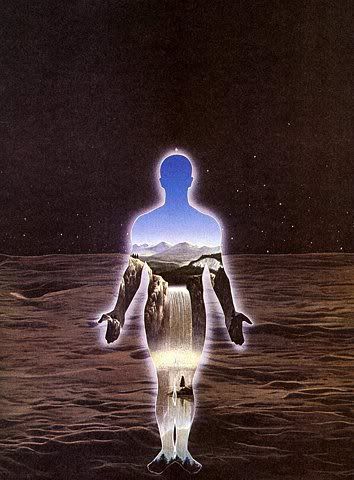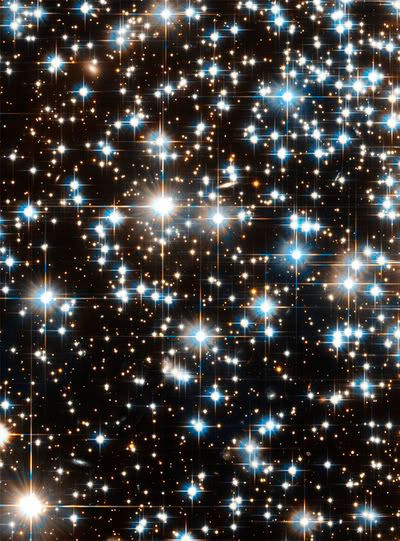Self-contentment gives a man the power to control any of his attraction towards the wrong path.
If a person is not self-satisfied, he will always have ever increasing greed.
Even control over the universe would not give him satisfaction.
*

One thing is certain: no one who has ideals and imagination can be happy and content
merely in the personality. The personality gets hurt, suffers, is frustrated, angry, etc.
It has aspirations of some kind or other and is by no means content with whatever comes pass.
Therefore, happiness and contentment come from something in us which is not affected
by the personality. We can call this "something" Manas in the body—not higher or lower Manas,
but that consciousness or awareness in us which is able to analyse and commune with itself
from its already known premises, and therefore to understand what is happening around
and within its vehicles of emotion, desire, etc., without being coloured or absorbed by them.
When, for example, things go wrong, when adversity besets us, we have to make our mind
steady and undisturbed. Only then can we view these troubles without letting
the emotions of anxiety, fear and anger arise, and when these do not arise,
contentment, if not happiness, results.
How can we view adversity with such equanimity unless we have realized, to some extent,
that there is that centre in us, the Self, which is beyond these happenings and which is
not fundamentally anxious that this or that should or should not happen, is not
fearful of what may happen, or angry at whatever does happen! Let us search for
the root of these emotions. We learn that the first thing to forsake is "desire"—not just one
desire, but every desire that enters into our heart. Heart here stands for the seat
of emotions and is not to be confused with the mind or thinking faculty.
If we are asked to forsake every desire that arises from the emotions, then we must be
distinct and separate from those desires that are thought-produced and emotion-produced.
To realize this, is the first stage.
A later stage is reached when we go beyond our present thought-world.
To find who we are, we have by effort to get to some point within us which remains
undisturbed by our ordinary daily life of feeling-thought.
There must be such a centre, for what happens in daily life to desires,
emotions, etc., shows us a permanent aspect of our being which goes
through all such daily happenings. We know that all passes away in time,
that we move on to new surroundings each day, new desires arise,
new difficulties crop up, but the same we experiences them. We, therefore,
are not the desire, nor the anger, nor the anxiety, nor the fear that we experience; we remain
separate from all these thoughts and feelings unless we become absorbed by them.
Thus, in time, we come to understand that no happenings, whether favourable or unfavourable,
can really affect us if we are not too anxious, or fearful, or angry, about
the results of actions. Hence we are told not to think of happenings as favourable
or unfavourable, pleasant or unpleasant, good or evil. In time we shall be happy—not
emotionally excited, but at peace and without anxiety, fear, or anger, quietly accepting
all that comes, content and unruffled. The really happy person is not bothered whether
things are going well or ill, for with his personal desires and dislikes at rest he
receives all with an equal mind.
Likes and dislikes originate in the senses and organs. What the senses like, we call pleasure;
what they do not like, we call pain. The senses have become the agents of
mind-desire activity. We are thus led away by our senses instead of controlling them
and getting from them just the help we need in our evolution. Having let them go
astray, we now must begin to control them. The senses and organs are the horses that
draw the chariot and that run away with it (producing disease, pain, etc.) and also
with the driver of the chariot, leading him into all kinds of difficulties. Hence the
advice to withdraw them from their wonted purposes or sensations, and make them
draw our chariot where we will.
But even this control is not enough; it may lead to hatha-yoga. The further stage is to
understand what being happy and content "through the Self" means. Beyond that
which we call "I" is the power and strength and wisdom of the Self whose ray the "I"
in the body is. It is only when the "I" turns towards this Self that the real wisdom
of that Self can manifest. Tranquility of thought comes when the heart is obedient to the will,
when the "I" realizes that it is no longer the actor or possessor of anything,
even though it acts without covetousness, selfishness or pride, having abandoned all
desires. Desires will still arise in the heart, but they will no longer affect the person
or disturb him, because they are not mind-fostered. If we realize that desires,
lusts, etc., can never be gratified to the full, for they ever keep growing,
we shall see their falsity and shall let them die as they arise in the mind.
Ceasing to be obsessed by desires and emotions, the "I" is able to become the instrument
of the Self whose ray it is. It then begins to "embrace wisdom from all sides."
src

{Images linked/Programming by DPC}

